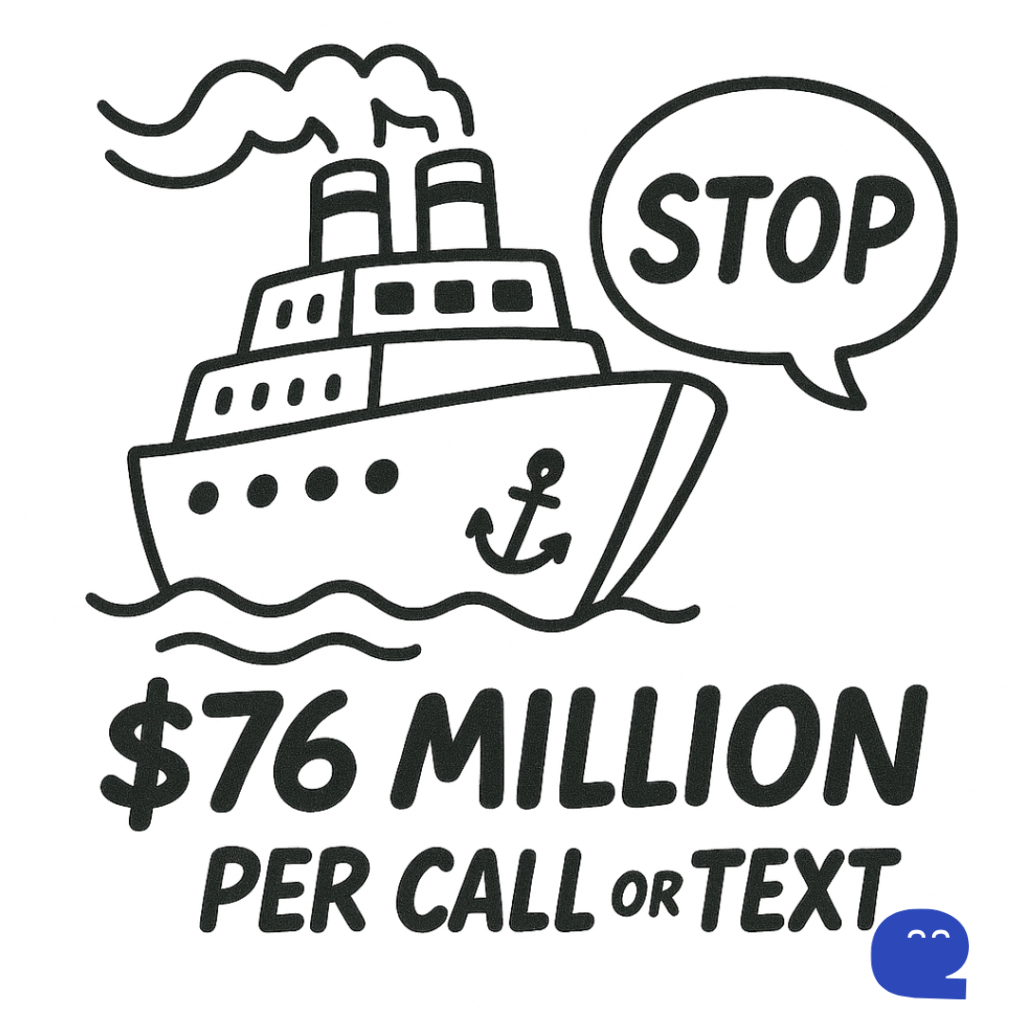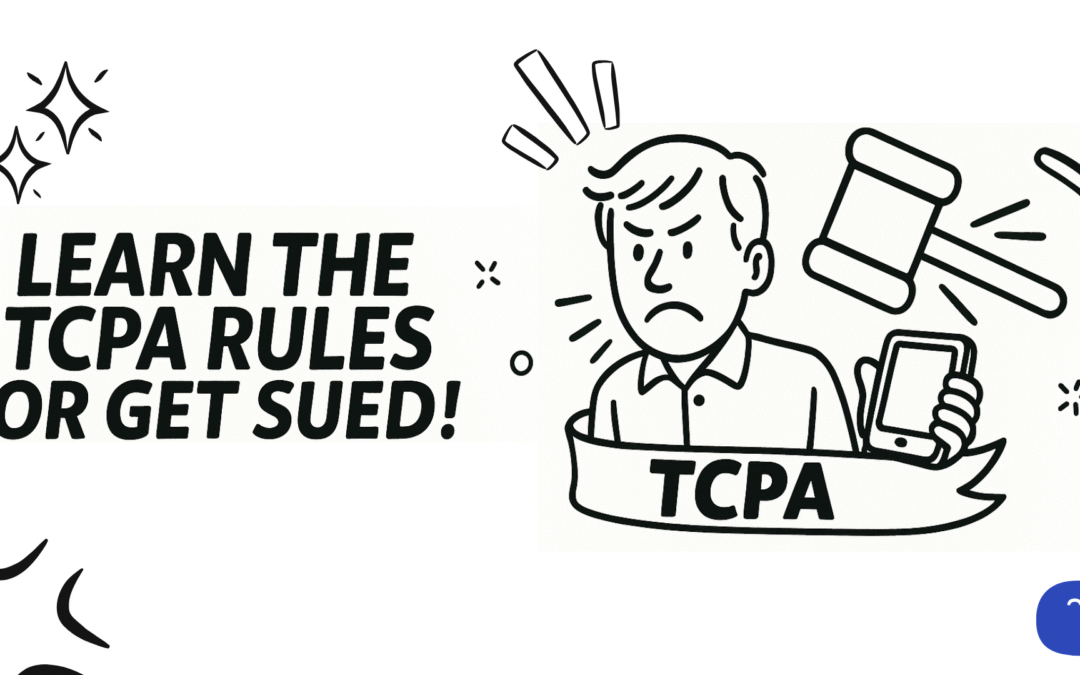Every day, 6 billion texts zip across the globe. Businesses, campaigns, and nonprofits all depend on calls and messages to stay connected. But here’s the catch: if you’re not following TCPA compliance, that one “harmless” text or robocall can cost you thousands.
The Telephone Consumer Protection Act (TCPA) was designed to protect consumers from unwanted calls, texts, and robocalls. With fines climbing as high as $210 million, this isn’t a regulation you can afford to ignore.
In this guide, we’ll explore:
- The rules of TCPA compliance.
- Real-life lawsuits where companies slipped up.
- Who’s exempt from the law?
- A simple checklist to stay compliant.
Why does TCPA compliance matter?

Sure, outreach is easy — a click, a call, a text. But getting sued? That wasn’t in the campaign plan.
Penalties range from $500 to $1,500 per violation — per call or text. Multiply that across thousands of contacts, and suddenly you’re looking at a settlement that could cripple your campaign.
But the biggest loss isn’t money — it is trust. Once people hear that you’re facing a lawsuit, your reputation takes the kind of hit no fine can fix. This is why TCPA compliance is essential for outreach.
When businesses got it wrong
Let’s look at real-world examples where companies learned the hard way why TCPA compliance matters in auto dialing:
Case Study 1: Caribbean Cruise Line’s $76M Mistake

- What happened: Between 2011–2012, Caribbean Cruise Line robocalled nearly 1 million people with “free cruise” offers tied to a political survey.
- The mistake: They used automated calls without express written consent.
- The result: A class-action lawsuit, four years in court, and a $76 million settlement with payouts of up to $500 per call.
- The story made headlines: “cruise ship robocall settlement” (video).
- Lesson learned: Don’t call or text anyone without documented consent.
Case study 2: American Eagle Outfitters’ $14.5m texting blunder

- What happened: American Eagle Outfitters sent 600,000 promotional texts from 2010–2017. Many recipients never gave written consent, and some still got messages after opting out.
- The mistake: No consent, and worse, ignoring opt-outs.
- The result: A $14.5 million settlement. Victims received $142–$285 each.
- Lesson learned: No consent, no outreach. Respect opt-outs immediately.
TCPA compliance essentials
Staying TCPA compliant isn’t optional — it’s the law. Here are the essentials every call center and texting campaign must follow to avoid lawsuits and fines.
1. Get Consent

(Alt text: tcpa-compliance-consent-first)
Express written consent is mandatory for marketing calls or texts. Here are acceptable methods:
| Method | Example |
|---|---|
| Online/paper form | “By providing your number, you agree to receive promotional texts…” |
| Checkbox opt-in | A non-pre-checked box: “Yes, I’d like to receive updates via text.” |
| Text message opt-in | A customer texts “JOIN” to 12345 to subscribe. |
For informational outreach, oral consent is enough — but a best practice is to always keep a log and safeguard your interests.
2. Timing and Do-Not-Call rules

Nobody likes calls or texts at odd hours. That’s why the rule is simple:
Only contact people between 8 AM and 9 PM local time (the customer’s timezone, not yours).
In March 2025, a South Florida firm filed 100+ lawsuits over TCPA timing violations, many involving texts.
Good news: Gaglers timezone texting and calling handles this for you, it automatically sends messages at the right time, customized to each contact’s timezone, so you stay TCPA-compliant.
Don’t forget the DNC registry
Always scrub your list against the Do-Not-Call (DNC) registry. If someone’s on it, you can’t contact them — unless exempt (e.g. political or nonprofit outreach).
🚨 New FCC Rules Alert
- Court rulings revoked the one-to-one consent requirement.
- The FCC now requires opt-outs to be processed within 10 days.
3. Opt-out must be easy

Always include a clear opt-out option for customers who no longer want to hear from you:
- In text messages: “Reply STOP to unsubscribe.”
- For calls: Allow a simple verbal opt-out.
And don’t stop there — make sure you regularly remind customers how to opt out or revoke TCPA consent if they’re no longer interested.
When you fail to do this, lawsuits happen (remember American Eagle’s $14.5M texting mistake?). Even if that doesn’t happen, you are paying precious dollars for outreach that is not welcome.
4. Identify yourself

Whether it’s a live agent or a robocall, you must always identify yourself as a business to stay compliant with call center rules. Every outreach should include:
- Your name and company at the beginning.
- A clear reason for why you’re calling or texting.
- A simple way to opt out (verbal or keypress).
Example:
“Hi, this is Maya from GreenLeaf Solar. We’re reaching out with an offer on home energy upgrades. If you’d like to stop receiving these calls, just say ‘Stop’ or press 9 now.”
🚨 New FCC rules alert
Some states have their own “mini-TCPA laws”:
- Florida: remove opted-out numbers within 15 days.
- New York: fines can reach $20,000 per violation.
What’s legal in one state might be illegal in another — always check local laws before launching your campaign.
Calls vs. Texts vs. Robocalls

| Aspect | Calls Compliance | Texts Compliance | Robocalls Compliance |
|---|---|---|---|
| Consent needed | Written for marketing; oral for informational calls | Written for marketing; oral for informational texts | Written consent for all marketing robocalls |
| Opt-out requirement | Must allow verbal opt-outs/DNC | Must include “Reply STOP” in every message | Must provide automated opt-out during call |
| Documentation | Store consent logs | Store consent logs | Store consent logs |
| Penalties | $500–$1,500 per violation | $500–$1,500 per violation | $500–$1,500 per violation |
| Common violations | Calling DNC numbers, ignoring opt-outs | Texting w/o consent, ignoring opt-outs | Robocalling without consent, sales robocalls |
Informational calls share necessary updates (e.g., delivery alerts, billing notices, or appointment reminders) and don’t include marketing or promotional content.
Read Also: Best Auto Dialer for Small Business: Great Features in 2025
TCPA compliance exemptions: who gets a pass?
Here’s a bit of relief: not every call or text lands you in hot water. The law makes room for certain messages that are too important to block. Think of these as the “lifeboats” in the sea of compliance. Here are the three significant exceptions every business should know:
Emergency purposes
When communication is critical, the rules ease up:
- Natural disasters like hurricanes, floods, or earthquakes.
- Healthcare alerts — outbreaks, water contamination.
- Safety warnings (active shooter alerts, evacuation orders).
- Critical outages, such as power or utilities failing.
In moments like these, speed matters more than consent.
Manual Texting
The TCPA is primarily concerned with automation, not humans.
- One-by-one, human-sent texts are fine.
- Using autodialers or mass-texting tools — even for just a handful of people — crosses the line.
So if it’s your fingers typing, you’re safe.
Nonprofits
Nonprofits get some breathing room:
- Fundraising: autodialers or prerecorded calls are okay for donations or events.
- Outreach: educational, volunteer, or service updates are generally exempt.
- Events: reminders or change notices are fine.
Rule update: Even exempted prerecorded calls to landlines now have limits:
- Max 3 calls in 30 days.
- Healthcare: 1 call per day, 3 per week.
🏫 Industry-specific exemptions
Some industries can send non-commercial, essential updates without worrying about TCPA fines:
| Industry | What’s covered |
|---|---|
| Financial institutions | Account updates, security alerts, fraud notices |
| Healthcare providers | Appointment reminders, test results, follow-ups |
| Pharmacies | Prescription refill or pickup alerts |
| Utilities | Outage notices, service updates |
| Schools | Closures, health alerts, and attendance messages |
⚖️ A quick word of caution
- Slip in even a whiff of promotional content, and the exemption disappears.
- Every exempt message must still say who it’s from and offer an opt-out.
- And yes — each state can add its own “mini-TCPA laws,” so always check local rules.
Want to dive deeper? Read the Best Call Center Quality Assurance Guide for 2025.
Quick TCPA compliance checklist
Eric J. Troutman — one of the country’s leading TCPA defense attorneys — once called the law:
“The biggest cash cow in history for the plaintiff’s bar.”
In plain English: if you slip up, there are lawyers lining up to turn your mistake into their payday.
So how do you keep your outreach safe without slowing it down? A TCPA compliance checklist. Think of it as your seatbelt for compliance:
1. Get consent
- Always collect express written consent before marketing calls or texts.
- Keep the language simple — no one likes legalese at signup.
2. Document everything
- Log who said yes, when, how, and to what.
- Store it in your CRM or compliance software so you can prove it later.
3. Honor opt-outs
- Make unsubscribing effortless: “Reply STOP” or say it aloud.
- Act fast — you now have 10 days max (less in some states).
- Pro move: test your opt-out system weekly to make sure it actually works.
4. Scrub your lists
- Regularly clean contacts against the Do-Not-Call registry.
- Outdated numbers? Remove them.
- Schedule monthly list scrubs like brushing your teeth — boring, but essential.
5. Train your team
- Compliance isn’t just the legal team’s job.
- Run quick refreshers and give people simple guides they can actually use.
6. Know your exemptions
- Only use them if your message truly qualifies.
- Unsure? Err on the side of consent — it’s safer.
7. Stay updated
- The FCC loves a rule change. States add their own twists, too.
- Keep tabs on FCC updates before they become lawsuits.
Pro tip: Gaglers integrates with CRMs like NationBuilder, Salesforce, Blackbaud, and NGPVan. That means every “yes,” “stop,” and “maybe later” is stored safely in one place.
This way, your outreach stays fast, personal, and — most importantly — lawsuit-proof.
FAQs on TCPA compliance
What are the rules of the TCPA compliance?
Get consent, honor opt-outs, and avoid calling during restricted hours.
What is a violation of the TCPA?
Sending calls or texts without consent, ignoring opt-out requests, or misusing autodialers counts as a violation.
What activities are prohibited by the TCPA Compliance?
Unsolicited marketing calls/texts without consent, robocalls without proper disclosure, and calls to numbers on the National Do Not Call Registry during restricted times are prohibited.
Is 10 DLC registration a TCPA compliance requirement?
No, 10DLC registration isn’t a direct TCPA requirement—but yes, it is very important for staying compliant with carrier regulations and avoiding message filtering or fines. It’s the mobile carriers who have mandated 10DLC to reduce spam and ensure only verified businesses can send mass texts. This builds trust, avoids message filtering or fines and improves deliverability.
Why TCPA compliance is a culture, not a checkbox

In the first quarter of 2025 alone, 507 TCPA class action lawsuits were filed — a jaw-dropping 112% jump from the same time in 2024.
The lesson? Compliance isn’t just about dodging fines. It’s about respect. Respect for people’s time, their privacy, and their right to say “no.”
When you put consent at the heart of your outreach, you’re not just avoiding lawsuits — you’re building something far more valuable: trust. And trust is the currency that keeps every campaign alive.
Stay ahead of the curve with Gaglers, a TCPA-compliant outreach platform designed to help you manage your campaigns seamlessly. Start your business outreach the right way — compliant, confident, and effective.
